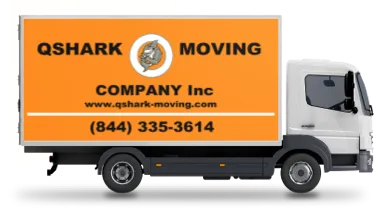What Movers Will Not Move?
Planning a move can be an overwhelming task. One of the first steps to a stress-free move is hiring professional movers. Yet, even the top movers have restrictions on what they can and cannot transport.
In this guide, we’ll go in-depth about what movers typically will not move. This information is crucial to know as you begin to pack and prepare for your relocation. Understanding these restrictions can save you valuable time and prevent potential complications on the moving day.

Why Do Moving Companies Have Restrictions?
Moving companies have certain restrictions for various reasons, mostly for safety and legal concerns. Movers aim to ensure the safety of your belongings, their team, and the public. Certain items can pose a threat if not handled properly or if they’re transported in a moving truck. Additionally, legal regulations prohibit the transport of specific types of items.
Below is a list of categories that movers usually do not handle:
- Hazardous Materials: Items that can cause potential harm or damage
- Perishable Food and Plants: Items that can spoil or die during transport
- High-Value Items: Items that require special handling due to their monetary or sentimental value
- Personal or Sentimental Items: Items that are irreplaceable or have sentimental value
- Pets: For obvious reasons, your furry friends need to travel with you
- Specific Heavy or Large Items: Certain items require special equipment or services to move
- Dangerous Weapons: There are specific rules about moving firearms and other weapons
- Chemicals and Cleaning Supplies: Many common household chemicals can’t be transported due to safety risks
- Other Non-Allowables: Any other items that movers typically won’t move
Please note: This list is not exhaustive. Always check with your moving company for their specific list of non-allowable items.
As you prepare for your move, keep this guide handy. It will help you understand what items to pack and what items you’ll need to make other arrangements for. By knowing what to expect, you can ensure a smoother moving experience with your best movers. And if you’re looking for cheap movers who don’t compromise on quality and service, remember to consider us for your next move.
Let’s delve deeper into each category and discuss the reasons behind these restrictions.

Hazardous Materials
Movers typically refuse to transport hazardous materials due to safety and legal reasons. These items can potentially cause damage or harm if they leak, ignite, or explode during the moving process. A comprehensive list of hazardous materials includes but is not limited to:
- Gasoline: Full gas cans or gas-powered equipment should be emptied before the move.
- Propane Tanks: Even if they seem empty, small traces of propane can pose a risk.
- Aerosol Cans: They can explode under pressure or high temperatures.
- Paint and Paint Thinner: They are flammable and can leak.
- Batteries: Especially car batteries and other types of large, rechargeable batteries.
- Fireworks: They are explosive and illegal to transport without a specific license.
- Cleaning Supplies: Some can be corrosive or react badly with other substances.
Pro Tip: If you’re unsure whether an item qualifies as a hazardous material, check the label. Words like “caution,” “flammable,” “corrosive,” or “explosive” are good indicators.
Perishable Food and Plants
Most movers do not transport perishable food and plants. These items can spoil, attract pests, or, in the case of plants, may not survive the move, especially if it involves crossing state lines (due to various state regulations). Here’s how you can manage these items:
- Perishable Food: Plan your meals ahead of the move to consume perishables. If you move a short distance, you could transport these items in a cooler.
- Plants: Consider giving plants to friends or neighbors or transporting them in your vehicle.
High-Value Items
For many movers, monetary and sentimental value items are often on the “do not move” list. These can include items like:
- Jewelry: Expensive or sentimental jewelry should be moved personally.
- Antiques and Collectibles: Antique furniture, stamps, coins, or other collectibles.
- Artwork: Original artwork or expensive prints.
- Electronics: High-end cameras, computers, or other electronics.
Remember: It’s always a good idea to keep these items with you during the move to ensure their safety.
Personal or Sentimental Items
Although not inherently dangerous or expensive, certain personal or sentimental items are often better moved by the owners themselves. This category includes:
- Personal Documents: Passports, birth certificates, social security cards, and financial documents.
- Photos: Especially older, irreplaceable photos that can’t be replaced if lost or damaged.
- Cash: Movers will not be responsible for cash.
Pets
Pets are a part of your family and, as such, they need to travel with you. Movers are not equipped to handle pets, and it’s safer and less stressful for your pets to move with you.
Important: Prepare a travel kit for your pet, including food, a leash, and any necessary medications.
Specific Heavy or Large Items
Certain heavy or large items may require special equipment or services to move. Some movers may not be equipped to handle these items. This category includes items like:
- Pianos: Due to their size, weight, and fragility, pianos often require specialized movers.
- Pool Tables must be disassembled and reassembled, which requires specific knowledge and tools.
- Hot Tubs: Like pool tables, they are large, heavy, and require disassembly and reassembly.
Dangerous Weapons
There are specific rules and regulations about moving firearms and other weapons. While some movers might agree to transport firearms, they must be unloaded and properly packed. Ammunition, however, is usually not allowed.
Chemicals and Cleaning Supplies
Many common household chemicals and cleaning supplies can’t be transported due to their potential for leakage and damage. These items include bleach, ammonia, and other strong cleaners.
Note: Always check with your moving company about their specific policies regarding these items.
Other Non-Allowables
Each moving company has a list of non-allowable items. Be sure to ask your moving company for their list. Other items typically not allowed include car batteries, paints, and other similar items.
Preparing Restricted Items for a Move
You’ll inevitably come across items that your moving company won’t transport. Here’s a step-by-step guide to handling these types of belongings:
1. Hazardous Materials
Hazardous materials, like gasoline, propane tanks, and paint, pose safety risks and legal concerns.
- Gasoline and Propane Tanks: Use up or safely dispose of gasoline before moving. Most cities have specific disposal sites for items like propane tanks. Check with your local waste disposal service for guidelines.
- Paint and Paint Thinner: If you have leftover paint or thinner, consider donating it to a local school, theater group, or recycling center. If you must dispose of it, check your local regulations for safe disposal methods.
2. Perishable Food and Plants
To deal with perishable food and plants:
- Perishable Food: Plan your meals to use up perishables before the move. Alternatively, consider donating unopened items to a local food bank.
- Plants: If you can’t take them with you, give them to friends, neighbors, or a local community garden.
3. High-Value Items
If you’re moving high-value items, like jewelry and antiques, it’s safest to move them yourself. However, you should prepare them properly:
- Jewelry: Keep jewelry in a small, secure box or case. Consider getting specific insurance for high-value pieces.
- Antiques and Artwork: Consider using a specialty shipping service if you can’t carry them. Before the move, please take pictures of these items to document their condition.
4. Personal Documents and Sentimental Items
For personal documents and sentimental items:
- Documents: Store personal documents like birth certificates, social security cards, and financial papers in a secure, portable file box. Keep this with you during the move.
- Photos: Digitize old photos and keep the originals with you during the move. For newer photos, store them securely to prevent damage.
5. Firearms and Weapons
Moving firearms and weapons requires special consideration:
- Firearms: Unload firearms and lock them in a secure, hard-sided case for transport. Be sure to check state and local regulations for transporting firearms.
- Other Weapons: Pack other weapons safely in secure boxes or cases. Consult local laws about transporting weapons.
Note: The key to preparing restricted items for a move is planning ahead. This ensures the safety of your belongings, the moving crew, and the public. If you have any questions about specific items, don’t hesitate to ask your moving company.
This concludes the section on how to prepare restricted items for a move. Next, we’ll discuss moving insurance and how it relates to high-value items. Stay tuned!

Moving Insurance and High-Value Items
It’s essential to understand the role of moving insurance when moving, especially when it involves high-value items. Not only does it provide you peace of mind, but it’s also a crucial step in protecting your valuables. Here’s what you need to know:
Types of Moving Insurance
There are usually three types of moving insurance:
- Released Value Protection: This is the basic coverage offered by movers for free. However, it provides minimal coverage—usually around $0.60 per pound per item.
- Full Value Protection: This is more comprehensive coverage where the mover is liable for the replacement value of lost or damaged goods in your entire shipment. This comes at an extra cost.
- Third-Party Insurance: If you’re not satisfied with the coverage provided by your moving company, you can purchase additional coverage from a third-party insurance company. This coverage will complement the basic insurance provided by your mover.
Declaring High-Value Items
If you’re moving items that are exceptionally valuable, you’ll need to complete a “High-Value Inventory” form. This form is used to list items valued at approximately $100 per pound or more. This might include items like:
- Jewelry and Watches: Especially those with precious stones and metals.
- Electronics: High-end cameras, computers, and other electronics.
- Antiques and Art: Antique furniture or original artwork.
- Collectibles: Coins, stamps, or other valuable collectibles.
Note: Remember to keep an inventory of your high-value items, including their estimated value and any identifying characteristics. It’s also a good idea to take photos of these items to document their condition before the move.
Determining If You Need Additional Insurance
Before deciding whether to purchase additional insurance, consider the following factors:
- Value of Your Items: If the total value of your goods is significantly more than what the moving company’s insurance covers, you may need additional insurance.
- Risk of Damage or Loss: If your items are delicate, antique, or not easily replaceable, extra insurance could be a good idea.
- Peace of Mind: Additional insurance can give you peace of mind, knowing that even high-value items are covered.
Pro Tip: Check with your home insurance policy. Some policies cover belongings during a move or offer an option to add this type of coverage.
Conclusion
Moving involves numerous details, and knowing how to prepare restricted items for a move is a crucial part of the process. Additionally, understanding the ins and outs of moving insurance ensures your high-value items are well-protected.
Remember, while your moving company can provide valuable guidance, it’s essential to research, ask questions, and make the best decisions for your circumstances. If you have any further questions or are ready to schedule a move, contact us for professional assistance.


